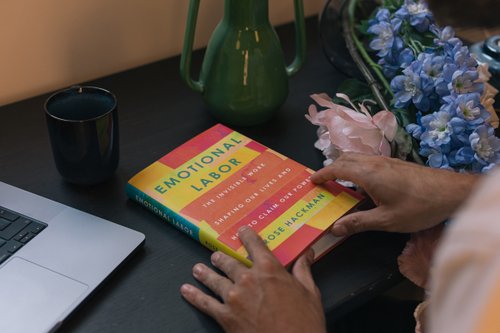Unlocking the power of a good apology
Jun 06, 2024
6 mins


Journalist
It’s easy to recognize a bad apology when you get one. You feel annoyed at best and cheated at worst. You may think that the wrong-doer doesn’t believe what they are saying. A bad apology puts the blame back on the person expressing hurt feelings, according to Kimberly Best, a mediator and founder of Best Conflict Solutions. It might include lines such as “I’m sorry you feel that way” or “I’m sorry if you were upset,” but that is not really an apology.
Why do we need to apologize?
As children, we are often pushed to apologize even when we don’t see why we should – “Tell your sister you are sorry” – creating the impression that simply saying the words “I’m sorry” is enough to make everything go back to normal. It isn’t, according to Best. “When we step on someone’s toes with an affront that’s intended or not, we cause a separation,” she says. “Hurt people withdraw or attack. Neither is helpful to a relationship. An apology can build the bridge back.”
This is especially important in a professional environment as research shows that apologies can promote forgiveness, reduce anger, and increase trust. “When we apologize, we’re not saying what we did was wrong or that we meant to hurt someone,” says Best. “We’re [saying] we regret that what we did hurt someone. . . It’s not an admission of guilt; it’s an acknowledgment of effect, of care, and of empathy. It’s recognizing that something [we] said or did hurt someone, and I see the hurt.”
The realization that his behavior was not acceptable caused Chris Maguire of Real Estate Exam Ninja to stop and reassess his actions while he was trying to negotiate the purchase of a rebrick building in San Francisco. When the seller stopped returning his calls, Maguire realized he had lowballed him – causing insult in the process. “Panic started to set in,” Maguire says. “I’d potentially blown my chance.” The next morning, he swallowed his pride and drafted a sincere apology email. “I acknowledged that my initial offer was disrespectful and didn’t reflect the true value of the property,” he says. “I highlighted the reasons for my interest in the building and expressed my genuine desire to find a win-win solution.”
To his surprise, he received a positive response. “He appreciated my candor and admitted my initial offer had caught him off guard,” he says. “We reopened negotiations, this time with a newfound respect for each other’s positions.” A deal was struck, and a lesson learned. “That experience solidified the importance of a well-timed apology in my negotiation toolbox,” says Maguire.
Empathy will take you far
When it’s warranted, an apology can demonstrate accountability, which is important for maintaining trust, respect, and professionalism, according to Edward Beltran, CEO of Fierce Conversations, a global leadership and development company. “Acknowledging the mistakes made versus just saying sorry allows for greater depth in the conversation, it builds trust, and drives accountability, ultimately meaning the relationship will grow stronger and have those things too.”
Emotional intelligence plays a big part in the psychology of an effective apology, according to Beltran. “Self-awareness allows you to understand your role and impact.” When someone points out your mistake or error – or even if you notice it yourself – you need to have the resilience to not become defensive or fearful, but to assume positive intent by those with whom you have relationships. “Empathy allows you to care about others and recognize that someone needs this emotional experience, which is a positive thing.”
It’s never too late to apologize
Empathy helped James Cunningham, a health and performance coach in Indianapolis, to realize what he needed to do after he received a complaint from a client. “[She had been] making great progress, but suddenly, her performance started to decline,” he says. “I was puzzled and, admittedly, a bit frustrated. So I pushed her harder, thinking she just needed a bit of extra motivation. However, this only seemed to make things worse.”
One day, she approached him and explained that she had been going through some personal issues and that the extra pressure from him was adding to her stress. It would have been easy for him to take offense or to insist that, as a professional, he knew what she needed. But he didn’t. “She was visibly upset and I realized then that I had made a mistake,” says Cunningham. “I had failed to consider what she might be going through outside of our training sessions.”
Cunningham apologized to her sincerely, acknowledging that he had been too focused on her physical progress and had overlooked her emotional well-being. “I assured her that her health, in all aspects, was my top priority and that we would adjust her training plan to accommodate her situation.”
That apology – along with the fact that he swiftly took action to address the issue – changed everything. “She was relieved and grateful for my understanding,” he says. “We managed to find a balance that worked for her, and she was able to get back on track with her fitness goals.” The experience taught him a valuable lesson about the importance of empathy and understanding, he adds. “It’s a lesson I’ve carried with me ever since. So yes, an apology, when sincere and followed by action, can indeed lead to a real resolution.” This holds true regardless of whether you are dealing with a friend, a client, or a colleague.
Both Cunningham and Maguire had the emotional intelligence to craft sincere apologies that mended fences rapidly. However, don’t worry if apologizing doesn’t come naturally to you, as it’s a skill that can be learned, according to Beltran. Seasoned managers recognize that mistakes happen all the time. It is all part of the journey. “It starts with self-awareness,” he says. “One of our core principles is to take responsibility for your emotional impact. You can leave an afterglow, an aftertaste, or an aftermath.” (Hint: It’s an afterglow you want to achieve.)
How can you make your apology genuine?
Humans are good at spotting disingenuous behavior. “Just saying sorry without the context of what you did, without key learnings and assurance that there will be improvement will signal to people that you are, in fact, not that sorry at all,” he says. “If your insincerity continues and you must repeat your apologies for the same issues over and over again, the relationship will suffer.”
So, how can you craft a sincere apology?
- Don’t make excuses… or try to justify what happened. “A common tactic used by those who are confronted with their bad behavior is to deny, defend, or deflect the issue, adding in ‘but’ and ‘because’ or why it wasn’t their fault,” says Beltran. “[They say] ‘I missed a deadline because John was late on his part,’ or, ‘I see how I could have done a better job, but the client was happy overall.’ This erodes trust.”
- Think through what happened… so that you truly understand why you need to apologize. “[Aim for] an honest examination of responsibility and acknowledgment of the other person’s feelings and a desire to set things right again,” says Best. “An apology is a heartfelt and sincere acknowledgment of someone else’s feelings. It is quietly and kindly delivered, with no strings or blame attached.”
- Be specific… about the actions, behaviors, and remedial actions that you will take in the future. Beltran says that simply saying, “I screwed up. Sorry,” is not enough. You need to be specific. For example: “I’m sorry I dropped the ball on XYZ project. I will make sure I log all requests in our shared file so you can see I have heard you and documented what is due. This won’t happen again.”
- Follow through… by not repeating your mistakes. “Empty and frequent apologies do not suggest sincerity or instill confidence,” says Beltran. “If you find yourself apologizing frequently, you should explore why that is.”
- Work on your self-awareness… and emotional intelligence. Don’t dive straight into saying sorry every time you make a mistake. “Take a minute, either through deep breathing or meditation, to activate your parasympathetic nervous system, the one that calms you down, before you engage in the conversation.”
- Stay curious… Ask a lot of questions about the disagreement or issue that caused the problem instead of getting defensive or denying that there is a problem. “This will allow for a richer conversation and, thus, a richer relationship,” adds Beltran. “Through this process, you may learn more about the impact you had than your initial thoughts [revealed and] connecting at a deeper level will ensure you are personally invested in future outcomes.”
- Be prepared… “A mistake people make is thinking you shouldn’t prepare for these conversations,” says Beltran. “You absolutely should. You can’t determine where the conversation should go, but you can be prepared for how it starts and the emotions behind it.”
Healthy workplaces are essential
Misunderstandings happen in all workplaces, and when they do you should be very curious to understand how the other person is feeling and what they are experiencing. “Proactive communication, such as giving and receiving feedback regularly, coaching, collaborative decision-making, delegating effectively, and working on your emotional intelligence, will mean less apologizing.”
According to Best, a good workplace culture should include space for mistakes and disagreements, and provide the resources to handle those moments. “Every workplace should provide conflict management training to managers and employees,” she says. “That training should include the biology of conflict; how nature and nurture influences us, and then tools for managing conflict, including listening to understand. They should also teach how to apologize.”
Mistakes are part of life, which means that knowing how to apologize effectively should be too. “We can’t go through life without stepping on people’s toes,” she says. “Growth comes from conflict. No conflict means no change. It means walking on eggshells and being disingenuous, which means being dishonest. Relationships cannot survive in this fake space. They can survive conflict though, and an apology can help that happen. The goal isn’t to not feel bad, it’s to know how to move through that to a better space.”
Photo: Thomas Descamps for Welcome to the Jungle
Follow Welcome to the Jungle on Facebook, LinkedIn, and Instagram, and subscribe to our newsletter to get our latest articles every week!

More inspiration: Mental health

‘We need each other’: Monika Jiang on combating loneliness in hybrid work
Hybrid work offers flexibility but can leave us feeling disconnected. Monika Jiang explores how we can rebuild workplace connections.
Dec 19, 2024

Struggling at work? Here are 3 steps to rebuilding your self-esteem
Low on confidence? Learn how reflection, recharging, and refocusing can help you rebuild self-esteem and thrive professionally.
Nov 27, 2024

10 ways to beat the Sunday Scaries
Even people who love their jobs can experience the Sunday Scaries. Psychologist Karen Doll offers several strategies to help manage and overcome it.
Sep 12, 2024

Unpacking the burden of emotional labor
Rose Hackman’s "Emotional Labor" reveals how managing emotions impacts everyone, especially women and minorities.
Aug 08, 2024

Is financial anxiety harming your productivity?
Feeling overwhelmed by financial anxiety? You're not alone. Discover practical steps and expert advice to regain control of your work-life balance.
Jul 31, 2024
The newsletter that does the job
Want to keep up with the latest articles? Twice a week you can receive stories, jobs, and tips in your inbox.

Looking for your next job?
Over 200,000 people have found a job with Welcome to the Jungle.
Explore jobs